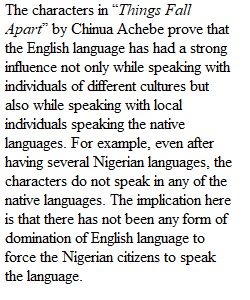


Q Chinua Achebe's work evidently portrays a lot of cultural intersections/globalization. The story was obtained and written through the understanding and intimacy of igbo cultures. Igbo communities are able to read and gain a sense of relativism to this text. It is written in English for broad outreach, meaning it was not solely intended for igbo people but for the world to read and gain a sense of understanding of what colonialism and its impacts had on this culture. By taking such intimate and heartbreaking stories of tribes and translating it for the world to read, it reaches broader audiences across the world and creates a sense of understanding. I am sure others who have had ancestors as victims of colonialism can relate to this story, despite it being framed around a tribe that is not theirs. This is because globalization creates relativism and broadens the reach of stories on a universal platform
View Related Questions